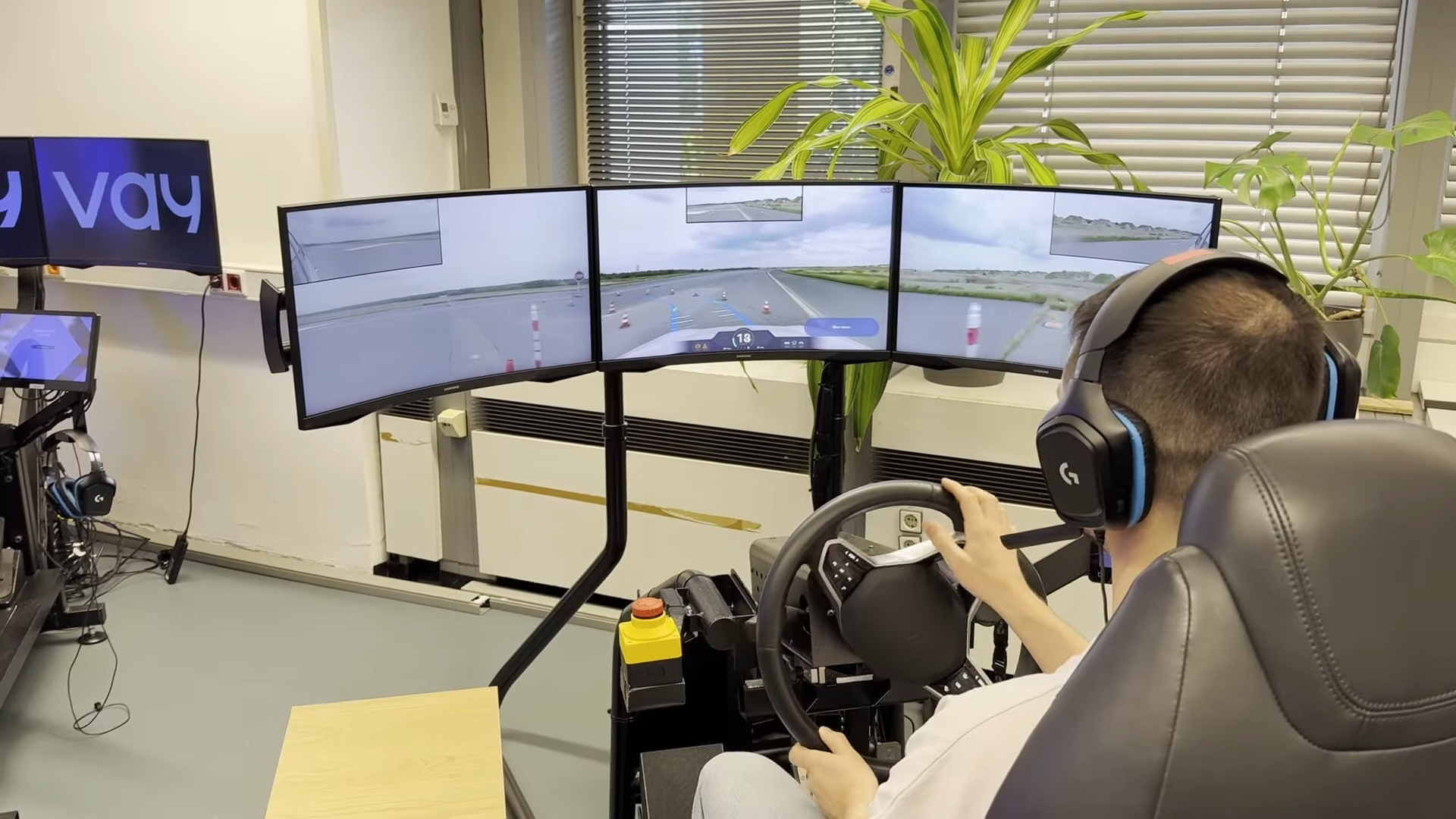German drivers remot…

My baby sister loves Euro Truck Simulator 2. She recently got a PC racing wheel so she can pop a podcast on and enjoy the simulated countryside of Germany pass her by in a more immersive fashion. My baby sister also has an actual car that she can actually drive (which is more than I ever managed). I’ll admit, I don’t really see the appeal of simulating an activity one could also readily engage in—so imagine my confusion when I heard about Deutschland’s remote robotaxis.
In the now-defunct Tegel airport in Berlin, drivers take to impressive driving simulator rigs to remotely control cars up and down the runway (via The Guardian). Pressing pedals from hundreds of metres away, the remote drivers monitor car movement over a video feed captured by four cameras on each vehicle’s roof. These remote drivers’ setup is giving me serious rig envy.
However, all of that pales in comparison to whatever high-grade driving simulator they’re using in this remote setup; the highback leather chair, the actual car steering wheel, plus the indicator knob is a dead giveaway that this is definitely not a bit of kit designed chiefly for gaming. The chair and indicator knob, too. Remote driver Bartek Sztendel says gaming experience helps in this line of work, but what’s more important is “the ability to stay calm and having a strong sense of safety and responsibility.”
This scheme is run by Berlin-based company Vay and is still currently in the testing phase (though it’s already operational in Las Vegas in the US). Self-driving vehicle services, like those offered by US-based companies Waymo and Cruise, are still illegal in Germany. However, thanks to recent legislation passed by the German government allowing for the commercial use of remotely operated cars, distant drivers could take to select, pre-approved roads from December 1 of this year.
With news about wrongful death lawsuits being brought against Tesla fresh in mind, there’s a key point I need to clarify about Vay—it’s not a remote taxi company, but essentially a rental car company enjoying a techy upgrade. The remote drivers don’t actually take passengers; they only deliver rental vehicles to clients who order them via the app. Once a client is finished with a vehicle, they don’t necessarily even need to figure out parking, as the remote driver will apparently step back in and drive the car away.
I mean, I still have questions about latency and the like, but remote-rental-cars-rather-than-taxis is a key wrinkle, with all driving decisions remaining the result of human judgement. If something goes wrong, the outcome falls to human responsibility—there’s no black box AI threatening to muddy the waters…unless the remotely-driven car loses signal. Would the car continue performing its last known input? Or does a loss of signal simply cut power to the car? Vay doesn’t say.
While we’re on the subject of safety, Vay’s chief executive and co-founder, Thomas von der Ohe, makes the case that this remote model is a better deal for the ‘taxi’ driver too. He explains that Vay has recruited remote drivers who previously worked for Uber, bringing with them horror stories of “knife attacks and facing other safety concerns.” Furthermore, Vay’s controllers are also paid by the hour and not the ride—unlike Uber.
Interesting to note Uber has had a chequered history of operation in Germany due to local laws protecting the taxi industry (the BBC also offers a brief rundown of this legal saga up until 2019). Von der Ohe is understandably keen to pitch Vay as a win for workers, deploying the example of former truck driving recruits no longer needing to spend weeks on the road away from family or suffering “stomach problems triggered by the vibration of his truck.”
He also says, “People see this as a job of the future. They get bathroom breaks and lunch breaks, they get to work in a team rather than on their own.”
According to Vay, app users will pay by the minute for their rented vehicle, though the company claims this will likely still amount to half of what other car-sharing services currently cost. However, I can’t help but wonder if Vay may one day borrow a leaf out of Uber’s venture capital playbook, jacking up the price if it finds resounding success. Mind you, perhaps my cynicism is getting ahead of itself. But with Germany’s new legislation, perhaps it won’t just be Vay heading out for a drive.

Best PC gaming kit 2025
